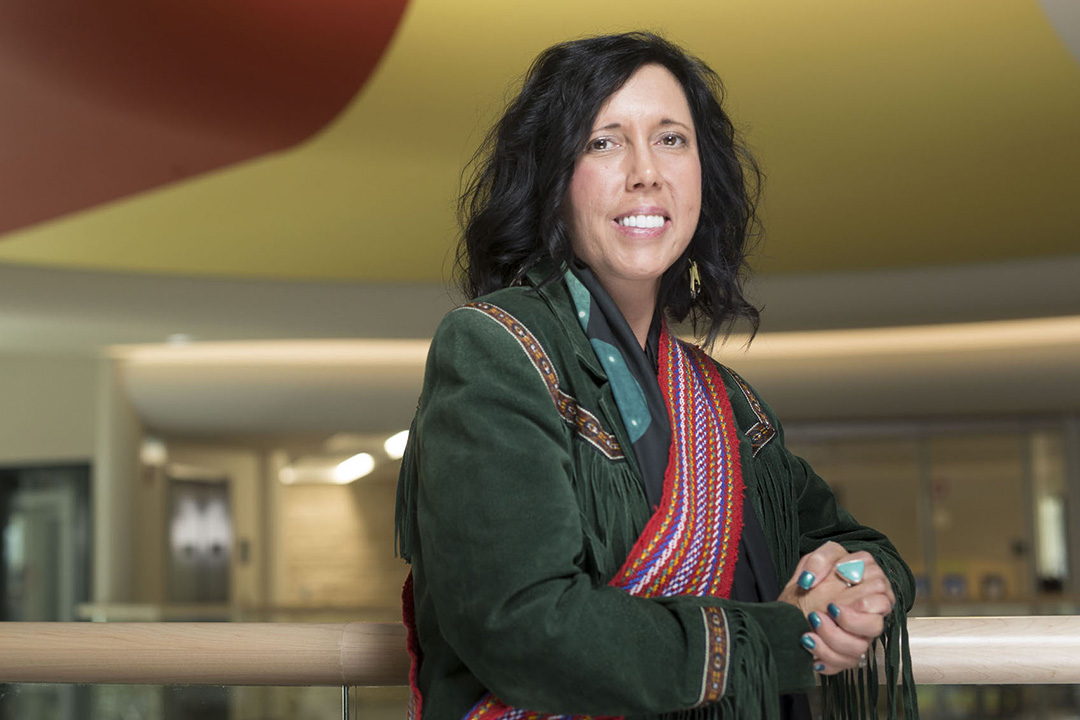
Morning Star Lodge and USask health research leader launch “Protecting Our Home Fires” strategy for COVID-19 prevention
University of Saskatchewan (USask) health research leader Dr. Carrie Bourassa and Morning Star Lodge, an Indigenous community-based health research lab in Regina, are launching a strategy to inform Indigenous communities about the risks of COVID-19 infection and how to prevent its spread.
“Morning Star Lodge is here to serve Indigenous communities, and we are doing our best to provide culturally safe, relevant and timely information in a variety of mediums,” said Bourassa, lead researcher at the lab and scientific director of the national Institute of Indigenous Peoples’ Health, a Canadian Institutes of Health Research (CIHR) centre based at USask.
“These contributions of disseminating knowledge around the COVID-19 pandemic are critically important. Indigenous communities are strong, and thus we focus on those inherent strengths during this difficult time.”
Bourassa, a faculty member in community health and epidemiology in the USask College of Medicine, is a Métis woman belonging to the Riel Métis Council of Regina Inc.
The strategy includes a series of short informational YouTube video clips to inform the public, as well as a COVID-19 fact sheet for Indigenous Communities that has a clinical focus and a Protecting Our Home Fires information sheet with a more community-based focus, both available at: http://www.indigenoushealthlab.com/blog Bourassa has guided her team in the design, editing, and endorsement of the fact sheets.
The first in a series of YouTube videos was released by Morning Star Lodge on March 25 and has been shared on social media. The video demonstrates proper hand washing techniques, and the message is clear: thorough, frequent hand washing is key to protecting yourself, your loved ones, and your community members from infection during this turbulent time.
Other short videos will include how to practice physical distancing and disinfect households, as well as important information about COVID-19.
“This information campaign is built around the important cultural and traditional practice of protecting the home fire, a central place where our community—children, parents, extended family, Elders, and Knowledge Keepers—comes together for warmth, nourishment, and storytelling, and to sustain relationships. It’s critical to protect the home fire,” said USask Vice-Provost of Indigenous Engagement Dr. Jacqueline Ottmann. “This campaign underscores and demonstrates the strength and resilience of Indigenous peoples.”
Shelly Cory, executive-director of the Canadian Virtual Hospice (www.virtualhospice.ca), said her organization will be sharing these resources to aid efforts around the world.
“Dr. Bourassa and Morning Star Lodge have shown great leadership in responding so quickly with high-quality, practical resources to improve the safety of Indigenous people during the COVID-19 pandemic,” she said.
Morning Star Lodge, located in Treaty 4 territory, is committed to engaging in partnerships with Indigenous communities and with groups such as All Nations Hope Network (www.allnationshope.ca), a Regina-based network of Indigenous people, organizations and agencies.
“We are committed to working for the Indigenous people in providing pimâtisiwin (life), a Cree Law that is incorporated into our way of life as Indigenous people of the land,” said Margaret Kîsikâw Piyêsîs, chief executive officer of All Nations Hope Network.
“We stand together in addressing this pandemic, as our ancestors foretold us this time would come, a time when we would practise wahkohtowin (kinship beyond the immediate family). Hiy hiy.”

